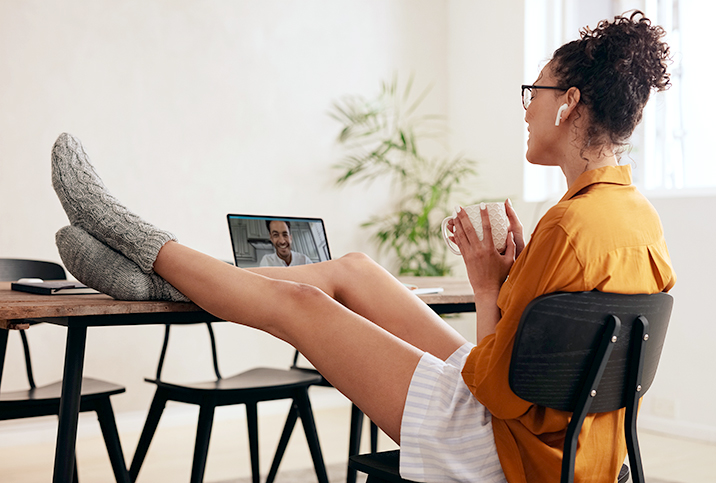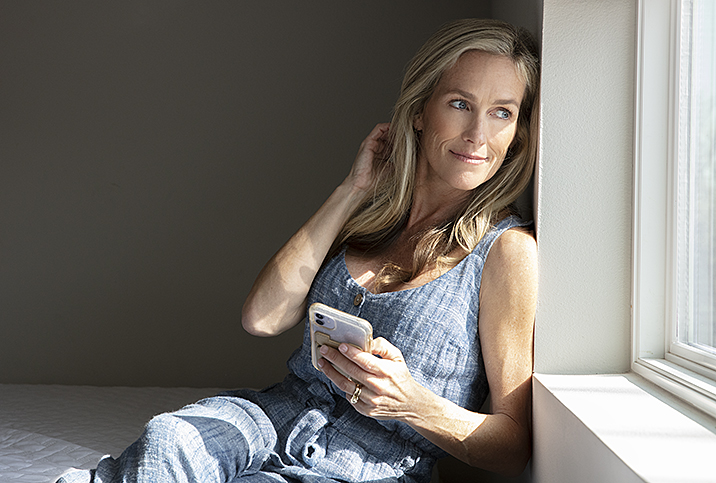So You Want to Start a Long-Distance Relationship

In an era when most days are spent staring at our phones or computer screens, building and sustaining a romantic relationship over a long geographical distance doesn't seem as far-fetched as it might have 20 years ago. In fact, couples around the globe are opting to keep their distance so they can maintain lives they've already built without missing moments of intimacy and connection.
Ryan Lorraine Cooper, a clinical psychologist in Johannesburg, said the proliferation of long-distance love points to a need shared by all humans.
"Connection is something we all look for," she explained. "Feeling connected is vital to us as a species. It's a sense of belonging, home, support and acceptance."
Of course, a relationship is not all moments of intimacy and bonding, especially when your partner lives thousands of miles away from your embrace.
Before I dived headfirst into a long-distance relationship, I sat down with my partner-to-be and discussed four topics we decided were the most important to us at the time. The decisions we made sustained us through two years of living apart. They could work for you, too.
Our independence
After nearly a decade of fierce female independence and singledom, I entered into a long-distance relationship at age 29. Though we both still had ties to the sweet seaside town in Florida where we grew up, he lived in frozen Minneapolis, while I opted to sweat in the swamps of Gainesville. When we ran into each other at a bar in our shared hometown during the final days of 2018, we were struck by the ease of conversation and the mutual desire to share more with each other.
Less than one month after that fateful night at the bar, I hopped on a plane to Minneapolis. By the end of that long weekend visit, we decided to give this long-distance thing a try. Today, we share a home in Los Angeles, but we recall our first two years of long-distance love as a critical step toward creating the relationship we needed: one where we both maintained sovereignty over the lifestyles we'd worked so hard to create as adults.
For independent-minded folks, long-distance relationships afford freedom from which true connection can blossom.
"Initially, it felt safe. I was able to connect from a distance," recalled my partner, Jamin Tcimpidis. "I wasn't sure how I felt about being in a relationship. Long distance helped me feel independent. Knowing what I know now about myself, codependency and boundaries, the distance helped me feel secure as I tried to navigate those areas."
Cooper said that for independent-minded folks, long-distance relationships afford freedom from which true connection can blossom.
"For some, remaining independent is a priority," she added. "These individuals have often developed boundaries in their relationships with others in order to ensure their autonomy and freedom. Long-distance relationships allow both individuals to navigate life focused on individual growth while using communication to keep and nurture their bond."
Our intimacy
Long before COVID-19 quarantines necessitated virtual communication, Jamin and I lived on Facebook Messenger and Snapchat. We'd exchange "good morning" pictures and videos, text throughout the workday and often video chat during the evening, treating it as quality time. We even scheduled "date nights" every now and then. Though I often grew tired with the kind of eye strain that accompanies extended screen time, Jamin enjoyed utilizing technology as a supplementary means of exploring intimacy.
Cooper said technology can provide a lot of benefits for a couple's intimate life.
"Sending flirty or saucy messages throughout the day can be very validating, and it can add a little spark and excitement for the day," she said.
She recommended informal video chatting during quiet moments at home.
"Couples can hang out online together, maybe both turning their cameras on and cooking dinner, maybe having a cup of coffee or glass of wine together while engaging in normal chitchat," Cooper said. "This can almost normalize the distance. When we set up appointments to meet someone online, it has a formal tone that can be quite distancing itself. These more informal appointments are quite lovely. It's not that there's a set agenda to discuss; it's more like, 'We're going to spend time together.' Ultimately, the time spent is how we feel the love."
Our trust
Cooper said trust between two people might be the most important pillar upon which a lasting partnership is built. She said trust is achieved from afar through proactive communication and consistent behavior.
"Normal insecurities and jealousies are bound to pop up in relationships, even with normal proximity," she said. "We shouldn't wait until something happens that we have to address. We can be proactive and honest and say, 'This is going to be difficult. There will be times when you or I have insecure feelings or jealous moments and we won't be able to quickly communicate to get reassurance.'
"It's personal for each couple, but choosing trust is very important," Cooper added. "Each partner has to behave in a way that both partners are comfortable with to engender trust. It's about consistency in our behaviors and being caring and considerate of our partner's needs, particularly emotional triggers. Think 'I do, as a loving partner, care how something would affect them.'"
Our plans for the future
A few months into my long-distance relationship with Jamin, I asked him if we could discuss closing the distance when we made it to the two-year mark, and he agreed. Unfortunately, some 14 months after we first got together, the COVID-19 pandemic began and time lost all meaning.
After we got vaccinated in spring 2021, we felt ready to begin planning for our big move. As we didn't want to move solely for our relationship sans other outlets or passions, we chose Los Angeles, where he could surf and I could see live music.
No matter what the future holds for us, something sustainable was built across those 1,500 miles.
Cooper explained that honest conversations about goals and expectations for the future are critical to ensure both parties are on the same page. She also advised flexibility, as we cannot control the future no matter how much we plan.
"Life is unpredictable," she said. "There may be hiccups, hurdles and shifts we can't account for beforehand, but we need to have honest conversations about what makes sense and agree on a time frame. Looking forward to the future as a couple can give confirmation that this is a serious relationship and both are in it with the same amount of commitment. If we have something to look forward to, that will help us hang in there. We can build up our excitement and make plans for it. It makes coming together incredibly special."
Long-distance relationships as a strong foundation
In the 13 or so months Jamin and I have lived together in L.A., I've had bouts where I felt more out of touch with him than when we were nearly 1,500 miles apart.
Back then, looking forward to our next visit marked time at an exciting clip, while the work-chores-eat-sleep-repeat cycle that accompanies cohabitation can make time stand still. However, there's nothing better than waking up from a nightmare to hear your love peacefully breathing next to you or spotting them doing an adorable little dance as they go about their day.
For Jamin and I, building a foundation of trust via long distance over those first two years meant we could take on all the challenges inherent in moving across the country together: starting new jobs, building new routines and discovering new things about ourselves and each other.
No matter what the future holds for us, something sustainable was built across those 1,500 miles.
"I have always felt a sense of trust and accountability with you," Jamin told me. "It's something I noticed in you early on when I met you and deeply appreciated. I felt you were honest with where you were and listened when other people were honest about where they were."
It's in these moments when I'm glad I can simply reach out and give him a big squeeze.


















